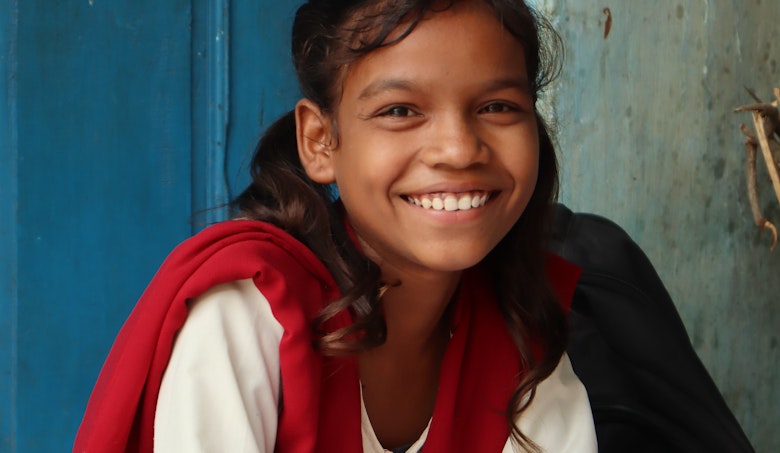Reena’s back to school journey
In Jharkhand, India, 14-year-old Reena and her family live in a village that is essential to the Mica supply chain. This means that most people there are involved in Mica collection and processing activities.
When the pandemic hit this area, the lockdown led to a decrease in wages, as well as a lesser demand for daily wage labour. This left people who were already living in precarious conditions even worse off than before.
As schools closed, Reena’s parents could not afford smartphones, which would have given Reena and her brother access to online classes. As a result, they both had to drop out of school during the first lockdown of 2020. Even though both parents were working (their father was a day labourer in neighbouring villages, taking part in agricultural and construction activities; their mother was engaging in Mica processing activities) their income was not enough to support the family’s basic needs. This meant that the children also had to start working – specifically, cleaning, segregating and delayering of Mica flakes at private factories.
“It was very disappointing for me to leave [my] studies while already enrolled in 8th standard. There was no other option for me. I decided to work in Mica processing activities along with my elder brother and mother, to meet our basic survival needs in a time of crisis. I injured myself many times in the factory and it hurt a lot” explained Reena.
Reena’s parents were also thinking of marrying her off, especially since during the pandemic marriages were cheaper.
Fortunately, Terre des Hommes Netherlands project staff Ms. Asha Kumari identified Reena during a home visit in December 2021. It was immediately clear that the family’s poor economic conditions were the primary reason why the children were not attending school.
Ms. Asha Kumari organised a meeting with the Self Help Group for Reena’s mother, and encouraged her to seek support. Reena and her brother were readmitted to school, and they were supported with educational material. Reena was assisted in the opening of a bank account so that she could receive a scholarship.
In addition, Ms. Asha Kumari, in coordination with the Balmanch Children’s Club and the VLCPC (Village Level Child Protection Committee) facilitated sessions for parents and children on the ill effects of child marriage. They were also informed about the toll free helpline 1098 to report cases of any child rights violations.
Reena’s mother was encouraged to grow mushrooms as an alternative way to earn money. This initiative was part of a community participative scoping exercise which assessed potential additional livelihood opportunities for Mica-dependent families.
In a period of three months (February to April 2022), Reena’s family earned a net income of INR 7,500 (about 95 USD) by selling mushrooms. After this success, in May 2022 the family was provided another INR 7,500 to further invest in the cultivation. They were also shown how to apply for Government social security schemes.
In two months, the family’s average monthly income increased by 50%. The additional income and the acquired livelihood options were beneficial, as they are now able to spend more time together as a family.
The Balmanch Children’s Club continues to monitor that Reena and her brother stay in school, and Reena is now one of the leading members of the club. They stopped engaging in Mica processing activities in February 2022. Reena was also saved from marrying too young, thanks to the awareness session provided by the project.
“I enjoy playing in the company of Balmanch members, learning from each other and resuming my studies. I acknowledge the support received from the Balmanch [club] in providing me with an opportunity to share and learn from my peers. I wish to pursue higher studies and become a doctor,” said Reena.

